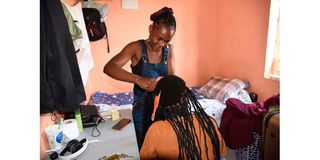Inflation: I can't afford 'boda' anymore, I walk to school

Doreen Saleh Nasimiyu, an Agriculture Economics student at Jomo Kenyatta University of Agriculture and Technology in Juja, plaiting a client's hair at her hostel during the interview on May 7, 2022.
What you need to know:
- The inflation rate in Kenya was at 6.47 per cent by end of April 2022.
- Women, who are the primary caregivers in most families, are the most affected.
- Doreen Saleh Nasimiyu, 21, a university student has resorted to braiding hair to meet her daily basic requirements.
The economic repercussions of the Covid-19 pandemic are being heavily felt globally.
Locally, the revealed the inflation rate was at 6.47 per cent by end of April 2022. This is the highest figure in the past seven months. Worse still, fuel prices hit a new high on Tuesday, setting up the country for a new round of increases in the price of basic goods and services.
One of the most affected categories is food and non-alcoholic beverages with an overall price increase of 12.15 per cent over the past year.
As a result, women, who are the primary caregivers in most families, are the most affected.
Additionally, they are the main participants in sectors such as food services, agriculture, education and trade, which were heavily disrupted by the pandemic. They are, therefore, particularly economically vulnerable to a rise in the cost of living.
We spent time with women from across the world, from different social-economic strata who explain how they are navigating the deep waters of inflation. In this inflation series, we speak to this women, one at a time.
Doreen Saleh Nasimiyu, 21, is an Agricultural Economics Student at Jomo Kenyatta University of Science and Technology.

Ms Nasimiyu outside the hostel where she now resides. She moved to this smaller space because she could no longer afford a self-contained house.
"It is market day today. I will be going to the local food market in Juja to haggle food prices with the mama mbogas (food vendors).I have Sh1,000 on me even though it will hardly be enough with the rising prices of essential commodities.
The meat vendor routinely waves at me to buy some meat from his stall but I cannot meet his gaze. I have not bought meat or chicken for a while. Milk is not even in consideration. Half a litre used to retail at Sh25 but the new price is Sh45.
I have resorted to food rationing by reducing my meals from three, to two a day. This is the only way I can afford to make monthly rent for my Sh4,000 single room accommodation.
Before the Covid-19 pandemic, I lived in a self-contained studio paying Sh6,000 a month. Since my single-parenting mother lost her job at a petrol station at the onset of Coronavirus, I am not only a student, but also my own sole provider.
The first thing I did was move to a smaller house where I share washroom facilities with six other occupants.
In August last year, I had to treat a severe urinary tract infection (UTI) because of sharing toilets. I now carry a lot of water to the toilet so that I can clean it before and after use.
The university clinic treated me for the infection. I would not have afforded medical care if my school didn’t offer it.
Barely profitable
The meagre income I make from my braiding business is not even enough to cater for my basic needs. I started braiding after I saw my mother struggle to take care of us.
With the high cost of living, I had to come up with a business that would sustain me. I have to create time for my studies and braiding. This is the only way I can survive the harsh economic times.
Nonetheless, the business is barely profitable because my primary clients who are students, can hardly afford to braid their hair. They would rather buy food. I get two clients a week on average as opposed to the five I would get a year ago.
The university also increased the school fees by Sh5,000. This, coupled with the inflated price of basic commodities, has been wearing me down. I apply for student government loans and bursaries to cover the fees. The printing costs are also astronomical now, I don’t print out notes anymore; I just read from my phone.
I do not want to defer from school, so I will apply myself in both my business and my studies to ensure I graduate.
I rarely take a boda boda (motorcycle) to the market or class anymore. The fare prices have increased, and I simply cannot afford it. And so today, and probably tomorrow, and the next day, I will walk..."
This story is published in collaboration with the Fuller Project.
Editor’s note: Nation.Africa and The Fuller Project produced this dispatch as part of our “Inflation” project, a collection of firsthand accounts on how the cost-of-living crisis is affecting the daily lives of women around the world.





